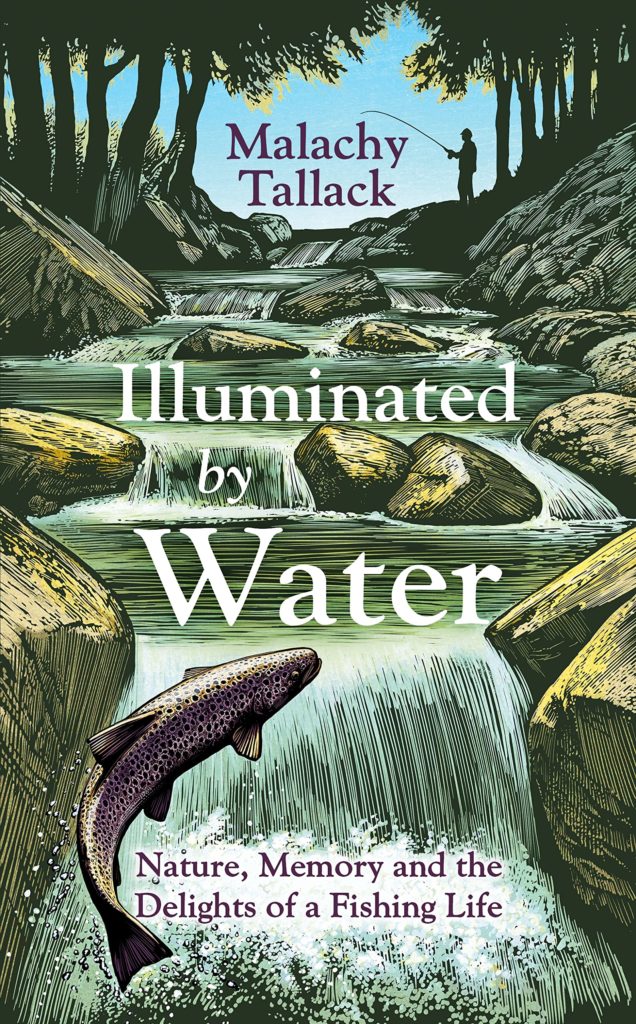Presented as a book about why people go fishing, Malachy Tallack’s ‘Illuminated by Water’ is really an old-school confessional memoir, writes John Andrews.

In every angling book there is a line that can hit you like the greatest opener to a novel you’ve ever read, and Malachy Tallack’s new book Illuminated by Water is no different. ‘I drove east, to the village of Dollar’ he writes, albeit on page 100 where in a sense this the book really begins. For although Illuminated by Water is presented as a book about why people go fishing, it slowly reveals itself over its course to be a memoir, a confessional in the old-school nineties style.
Throughout the book there is data, there are musings, justifications, context which presents itself like concepts an agent might have suggested, as if someone other than the author felt there was a need for the book to have something for the non-angler, to acquire a broad appeal. But whilst exploring angling from a variety of viewpoints be they social, political, historical and ethical is fine in principle, the reality here is that at times it crowds out the narrative, which in the case of Tallack is a shame, for his is an intriguing one: the tale of a boy born in Sussex who falls in love with fishing a lost world — ‘We arrived at Scaland Wood, and found a space at the edge of a little lake, its banks congested by trees’ — only to be uprooted at the age of eight to go and live on an island without rivers (Shetland).
Ironically, it is on the banks of several rivers that Tallack finds the illumination of the book’s title, through the act of fishing as the waters of the Devon, the Don and the Clyde teach him that sometimes questions are futile and that you just have to let the water take you. Tallack writes so well in these narrative sections that you wish his editor possessed both the courage and vision to have halved the length of the book and to have made it a collection of these stories, so well written are they, something akin to Charles Rangeley-Wilson’s groundbreaking Somewhere Else (Yellow Jersey Press, 2004) or the unsung Fishing in Wild Places by David Street (Golden Grove Press, 1989). In places Tallack’s prose recalls the beauty of Norman McClean, author of A River Runs Through It (University of Chicago Press, 1976) — ‘I let my feet settle in among the unseen stones’ — and at times Tallack summons up the coldness of Ted Hughes — ‘I watched, unenlightened, as the dead goosander drifted downstream, making its way, effortlessly, towards the bright lights and bustle of Glasgow.’
All the while Tallack’s unerring restlessness urges the reader to follow him. And follow him you do, past the odd historical inaccuracy (Hemingway was not the first angler to catch an Atlantic bluefin tuna off the Bahamas in 1934; they were being caught as early as 1929 much closer to home off the east coast of Yorkshire), past the village of Dollar from which the reader may never escape, past ‘the feeling that so much can go wrong, that so many things lie between you and the fish. Mistakes, accidents, broken line, bad knots, leaking waders, flies that fall apart,’ past a nagging dissatisfaction to a moment that seems to define the book, which may perhaps have been the very seed for it:
It occurred to me that this was the first time I had deliberately cast for coarse fish since I was sixteen years old. Since the day my father died, in fact. On that hot afternoon in Sussex, so far oblivious to what had happened, I caught tench (two of them, if I remember right, though it’s possible I don’t). Afterwards, I packed away my ugly fibreglass rod – the one I’d bought with my uncle eight years previously, the one that had accompanied me through my childhood summers – and I never used it again. In a lifetime of angling, there are currents and eddies. There are sudden changes of direction. There are memories that rise, unbidden, to the surface.
As any angler will tell you, trying to answer the question of why we fish is near on impossible. Tallack’s attempts at it are admirable; laudable in the 21st Century, when angling needs to be understood against the changing context of the world, needs to find its place in society once again — but sometimes, as any angler will tell you, you just need to surrender to the call of the water. As John Maclean put it in A River Runs Through It, ‘To him, all good things – trout as well as eternal salvation – come by grace and grace comes by art and art does not come easy.’
*
‘Illuminated by Water’ is out now, published by Doubleday.